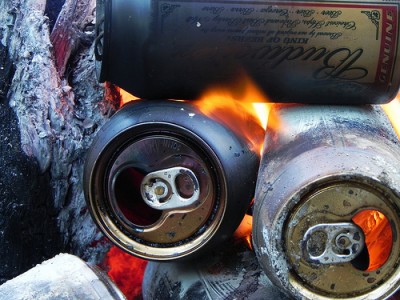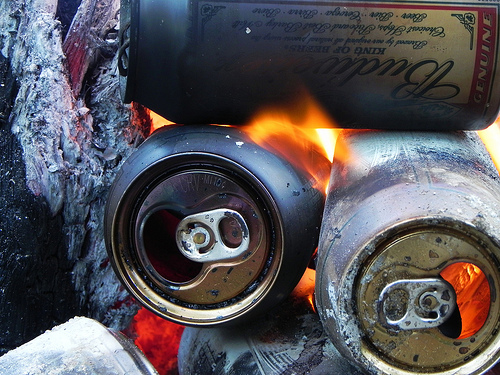
Throughout the last few weekly readings, things have been going quite well for the Hebrew tribes—nothing bad has really happened and everyone is excited to have the Tabernacle up and running. This week in Parashat Shmini, still on the high of the last few weeks, we move to the last day of sacrifices, with the sin of the Golden Calf far behind us. Moses and Aaron enter the Tabernacle and all is well, then Nadav and Avihu enter… and are instantly killed by a fire from God.
Just like that, half of Aaron’s sons are wiped out for doing what we have been led to believe was their job. The text leaves us only one cryptic clue as to why this happened, telling us that they brought a “strange fire.” Moses and Aaron had their sacrifices going up in flames created by God, but they brought a fire from another source. This may have been a sign that they were performing the sacrifice at an inappropriate time. If they were doing it at the correct time, would they have needed a foreign fire when God usually came down to burn the sacrifices? More than bad timing, the fact that they were bringing the fire in their own censers shows they were completely aware of this.
Could willfully bringing an untimely sacrifice be a strong enough reason for them to lose their lives? The second century Rabbi Bar Kappara, in the Midrash Rabbah, a large collection of stories that expand upon biblical texts, seems to think so. According to Bar Kappara, there were several reasons that Nadav and Avihu were killed, and one of them was that they performed a sacrifice at the wrong time. Another reason listed, this one in the name of the ancient sage Rabbi Levi, was that Nadav and Avihu were drunk when they entered the sanctuary. This argument is given weight by connecting the event to the next lines of the text, in which God commands that those who enter the Tabernacle drunk will surely die.
This scared me. I’m not going to deny that in my younger days, I probably definitely went to services a little… tipsy. If you go to Shabbat afternoon services after a quality Kiddush and/or lunch, you’ve probably prayed drunk too. Last week for Purim, I went to my favorite local synagogue excited to celebrate. At this very Orthodox synagogue, at about 9:30 p.m. with everyone pretty much completely trashed, we gathered a minyan for the evening service. Well, if my rabbis say it’s okay to pray wasted, at least on Purim, that must mean praying with a little booze in your system not on Purim, while not good, probably isn’t so bad it deserves a death sentence.
So the question of why Nadav and Avihu were killed is still unanswered. Some of the rabbis took the issues and concluded that it wasn’t just one sin, but several, such as overruling Moses’ legal decisions or not working together. It’s possible, but I’d rather not imagine striking people down after reaching four sins.
In my research, I found a new interpretation, one that honestly shocked me. The Ohr HaChaim, a 17th Century Moroccan Kabbalist and Talmudist named Chaim ibn Attar, wrote,
They came close to G-d and died” (Leviticus 16:1) They approached the supernal light out of their great love of the Holy, and thereby died. Thus they died by “divine kiss” such as experienced by the perfectly righteous; it is only that the righteous die when the divine kiss approaches them, while they died by their approaching it… Although they sensed their own demise, this did not prevent them from drawing near to G-d in attachment, delight, delectability, fellowship, love, kiss and sweetness, to the point that their souls ceased from them.
Thus Nadav and Avihu did not necessary die as a punishment, rather they drew so close in relationship to God out of love that they touched upon something that was so holy that their lives in this world could not continue any longer.
It isn’t necessarily any easier to accept this—go above and beyond in your relationship with God and you’ll find yourself dead. What we are left with, then, are two ways of viewing the situation of Nadav and Avihu— either disrespect God and be killed, or we can love God too much and be killed. They seem, at first, two very different interpretations, but perhaps there is one singular message: Put heart into what you do, but don’t go to extremes.
Nadav and Avihu, if we go with the more common interpretation, weren’t truly dedicated to serving God. They got drunk on the job and performed sacrifices more because it was what they were expected to do as priests than out of any desire to serve God. There was no energy, love, or true dedication in what they were doing. Thus, they were consumed. When we find ourselves working on projects we don’t care about, or living a lifestyle that we aren’t proud of, we can feel consumed by the work, our daily lives can feel meaningless and lifeless. We have to draw meaning, and find a way to live that we can feel some dedication to in order to feel truly alive. However, if the fire of our dedication is too great, we can find our lives consumed by this too. Go to extremes, and we can put others off from us socially, or even hurt them. Think of the person who is completely dedicated to his school work and academics. He doesn’t enjoy himself, and very few people want to be friends with someone who does nothing but study and work all day, who does nothing but talk about his projects. The Rabbis, with their differing views on Nadav and Avihu are essentially trying to teach us not to be that guy, of the critical importance of finding balance in life.
David Gutbezahl is a student at Gratz College.

